Alma Rosé’s family played a vital role in the development of both her musical career and her strong personality. Her father, Arnold, was a leading musician in Austria, serving as violinist and concertmaster of the Vienna Opera and the Vienna Philharmonic for more than half a century. His talent was known internationally thanks to the Rosé Quartet, which he founded with his elder brother Eduard in 1882 and led until it disbanded in 1945.
Alma’s mother was Justine Mahler, sister of the composer Gustav. After the demise of their parents in 1889, Gustav had become responsible for the welfare of his four siblings, Alois, Justine, Otto and Emma. A particularly strong relationship developed between Gustav and ‘Justi’, as he used to call her, which was described by Alma Mahler, Gustav’s wife, as ‘a kind of marriage’. [1] They were so close that Justine postponed her own marriage until her brother had found a suitable bride for himself. [2] She married Arnold Rosé on March 10, 1902, one day after the wedding of Gustav Mahler and Alma Schindler.
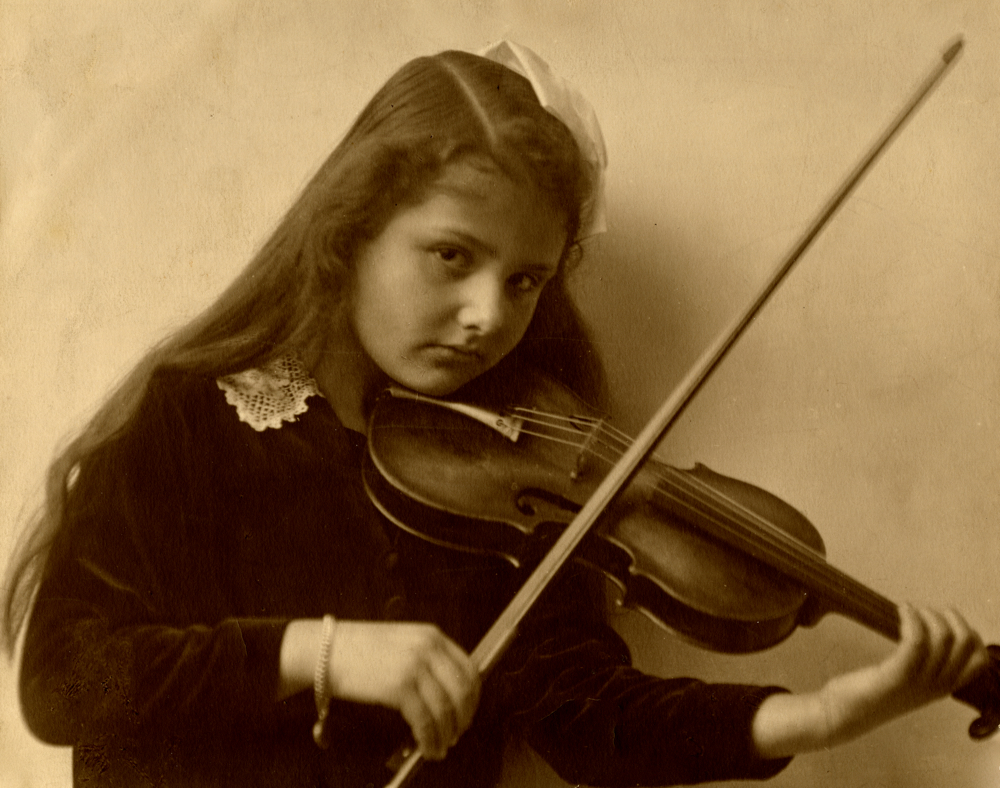
Alma Rosé as a young girl in around 1914. Photo: Gustav Mahler–Alfred Rosé Collection, Music Library, Western University, London, Canada
The Rosés, like the Mahlers, were of Jewish ancestry. An intolerance towards Jewish people was already felt in Austria and Germany long before Adolf Hitler decided to use it to his advantage. [3] Mahler was confronted with it once he expressed the desire to become director of the Vienna Opera in 1897. It soon became clear that his religion was a cause of mistrust and his application was vehemently opposed by personalities like Cosima Wagner, widow of the composer. To end the impasse, Mahler converted to Catholicism and promptly got the job.
Justine had also converted to Catholicism to help promote her brother’s career, while Arnold Rosé had been baptized as a Protestant Christian. When their daughter Alma was born on November 3, 1906, she was baptized as a Protestant, as was her brother Alfred. Within a couple of decades, however, these preventive measures proved to be useless. As Mahler said prophetically: ‘I am threefold homeless: as a Bohemian among the Austrians, as an Austrian among the Germans, and as a Jew all over the world. You are an intruder everywhere, welcomed nowhere.’ [4]
Despite this, young Alma (named after her aunt) grew up in a wealthy, refined and culturally inspiring environment. With her big, dark eyes and curly, brown hair, little ‘Almschi’ was the joy of her parents, particularly her father. At first glance, the fact that Alma began to play the violin before she was six can be seen as a natural consequence of her environment. Apart from her father and her uncle Gustav, her uncle Eduard was a cellist, her brother Alfred played clarinet and piano and her girlhood friends included the violinist Erika Morini and the singer Margarete Slezak. But Alma’s passion for the violin and her determination to succeed were deeply rooted in her unconditioned affection for her father. She idolized him and wanted him to be proud of her, more than anything else. [5]
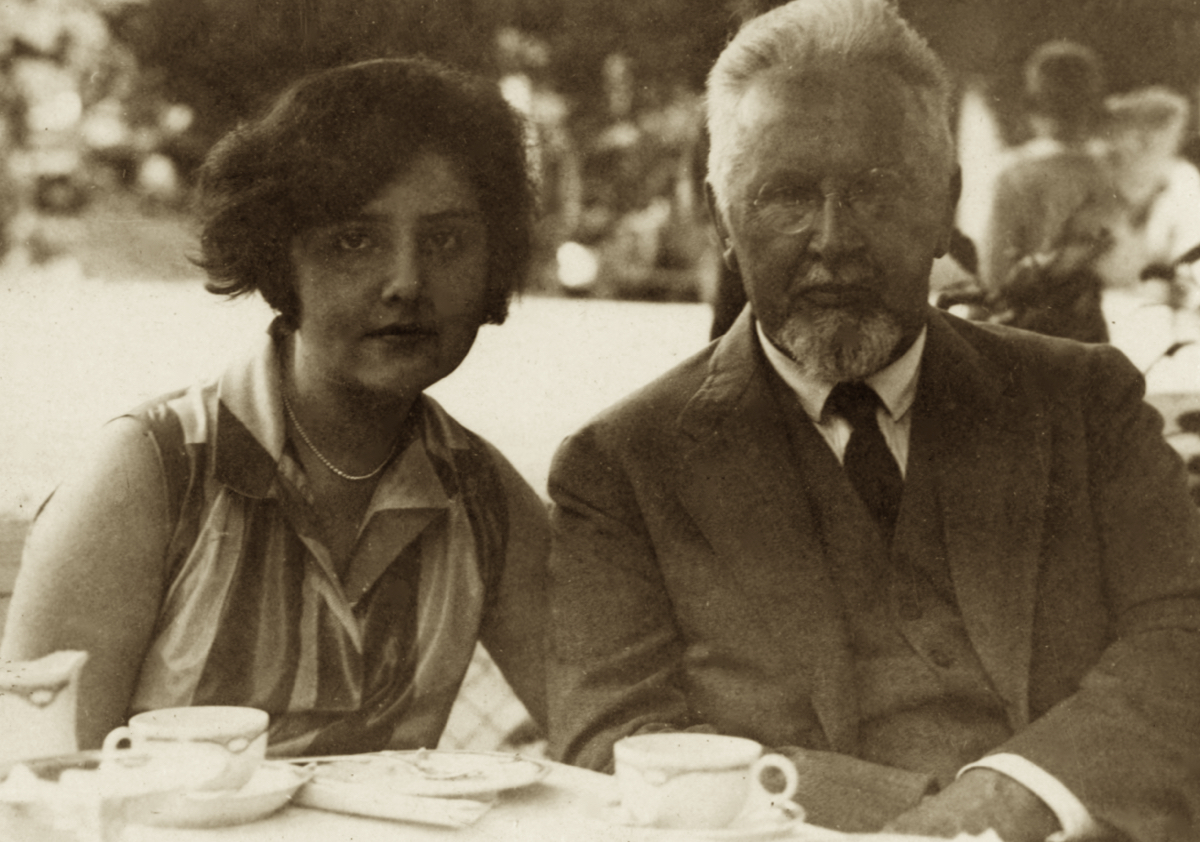
Alma and Arnold Rosé, date unknown. Photo: Gustav Mahler–Alfred Rosé Collection, Music Library, Western University, London, Canada
In his biography of Alma, Richard Newman explains that Arnold used to gave his daughter a violin lesson each morning before breakfast. Young Alma ‘eagerly passed up her morning chocolate until after the lessons, in complete contrast to Alfred.’ [6] This suggests an eagerness to self-sacrifice in order to achieve her goal. Before long she was playing both violin and piano up to six hours a day. She applied this discipline not only to herself; she also challenged her environment and was often perceived as a stickler for perfection. This behavior would become increasingly evident as she grew up.
During Alma’s childhood Arnold reached the height of his career. In 1913, for his 50th birthday, he was presented with a Stradivari violin by a group of wealthy music lovers led by Countess Mysa Wydenbruck-Esterházy. This instrument would later on play a role in Alma’s life, although her own violin was a 1757 G.B. Guadagnini that her father bought in The Netherlands in 1924.
‘Alma Rosé… is loved in Vienna for her father’s sake, and as a niece of Gustav Mahler. Such descent suffice to ensure a full house – but it is a sword that cuts both ways’ – music critic in 1926
Soon after World War I Alma entered the Vienna Conservatory, where she studied with one of the most famous teachers of the time, Otakar Ševčík. Hard work and attention to detail were the basic principles of his method, which must have suited the determined Alma.
Alma’s official debut took place on December 16, 1926, in the Great Hall of the Wiener Musikverein. The importance of the location was enough to daunt even Alma. She appeared hesitant at times, as the press recorded: ‘Something of an event was the debut concert of Alma Rosé. She is loved in Vienna for her father’s sake, and as a niece of Gustav Mahler. Such descent suffice to ensure a full house – but it is a sword that cuts both ways, for expectations in such cases are far higher than usual. Young Miss Rosé was visibly conscious of the difficult situation, and to some extent hampered by it. The Beethoven Romance [in F] suffered from such “inhibitions,” and to some extent also the Bach “Double” Concerto, which her father played with her. Only in the Tchaikovsky Concerto did the young artist attain that freedom both of technique and expression which is criterion of the true artist and no doubt latent in her. She has all the fundamentals – a solid technique and a musicianship inherited from and cultivated by her illustrious father. What she still lacks – the assurance to place such merits in the right light – can be acquired only by routine and experience, which is merely a question of time.’ [7]
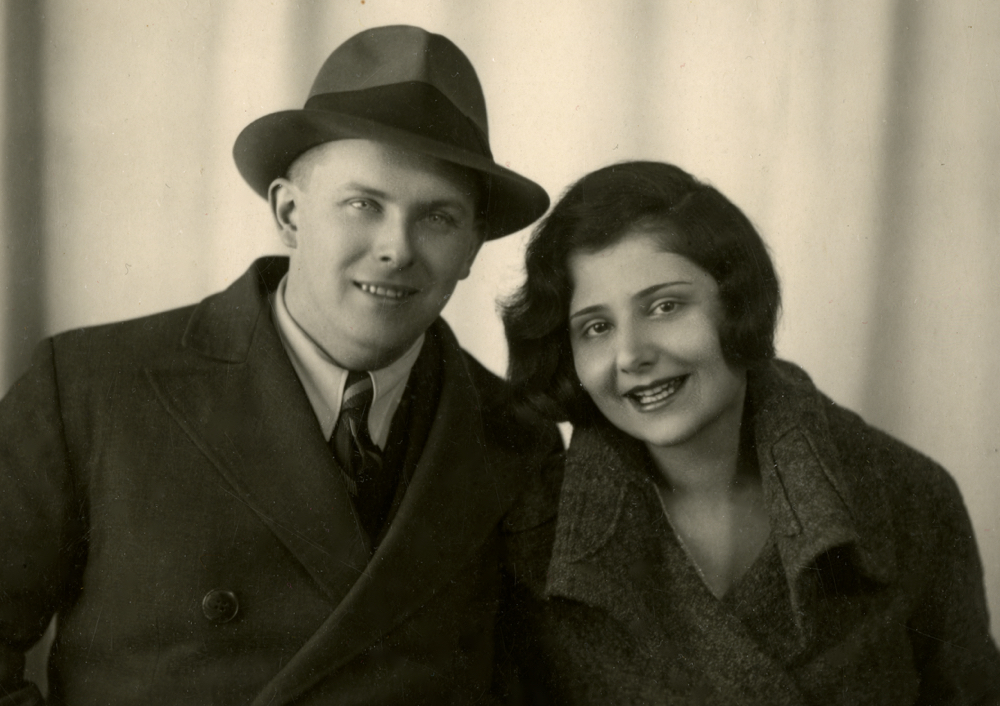
Alma Rosé and her husband Váša Příhoda in 1933. Photo: Gustav Mahler–Alfred Rosé Collection, Music Library, Western University, London, Canada
Arnold Rosé and his quartet toured extensively in 1927. His family traveled with him to Paris and then in August to Badenweiler in Germany, on a twofold secret mission. Arnold had an operation on the ring finger of his left hand, while Alma underwent a rhinoplasty. While in Badenweiler, the Rosés made the acquaintance of Váša Příhoda. The charismatic young Czech violinist was an acclaimed star by then and Alma fell under his spell. The two kept in touch while focusing on their careers. Alma gave several concerts to a mixed reception: while some critics praised her technique and passionate playing, her style was often compared unfavourably to that of her father. Nevertheless, she had a busy schedule.
On September 16, 1930, Alma married Příhoda in Vienna. The couple went to live in Příhoda’s monumental villa in Zariby, close to Prague, where initially Alma was enchanted by married life. Her husband was rich and famous, had an extravagant lifestyle and expensive hobbies (he owned 30 vehicles), and Alma enjoyed driving around in her sporty convertible (Příhoda’s gift) with her beloved dog Arno. But, left alone for months by her husband, she grew anxious and possessive, especially as rumors suggested that Příhoda was unfaithful to her. What’s more, Alma was not given an allowance by her husband and she strugged to make a living from her concerts.
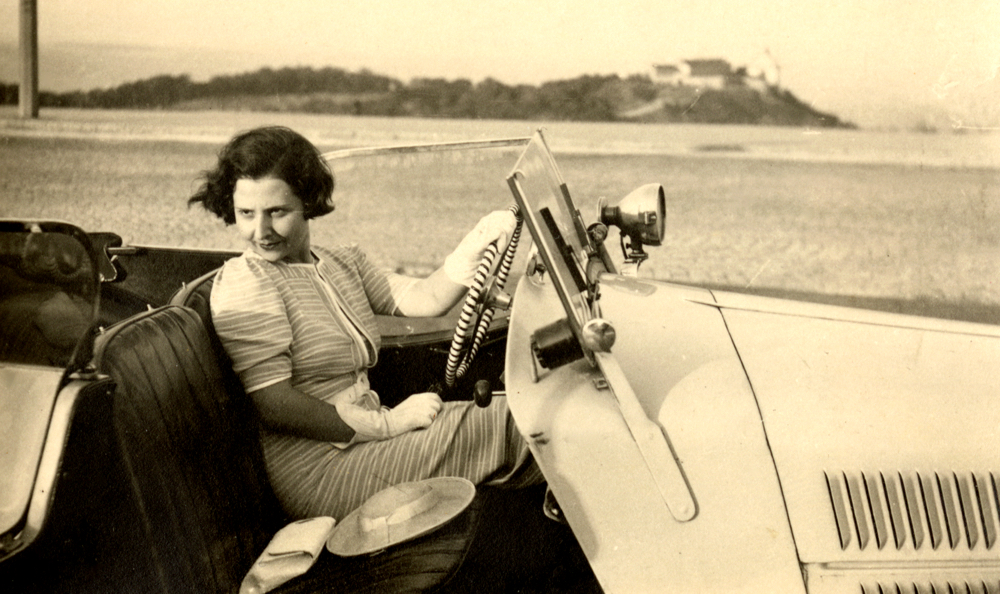
Alma Rosé in the sports car given to her by Příhoda after their marriage. Photo: Gustav Mahler–Alfred Rosé Collection, Music Library, Western University, London, Canada
Facing financial and marital problems, Alma decided to found an all-female chamber orchestra in 1932. She looked for musicians with the help of friends and colleagues and by contacting conservatories. Her father helped her with the auditions and soon enough the Wiener Walzermädeln (The Waltzing Girls of Vienna) were born. Their first concert took place in Vienna in 1933 and was a hit. Their repertoire of polkas, waltzes and popular operetta music was a novelty at the time and the public loved it.
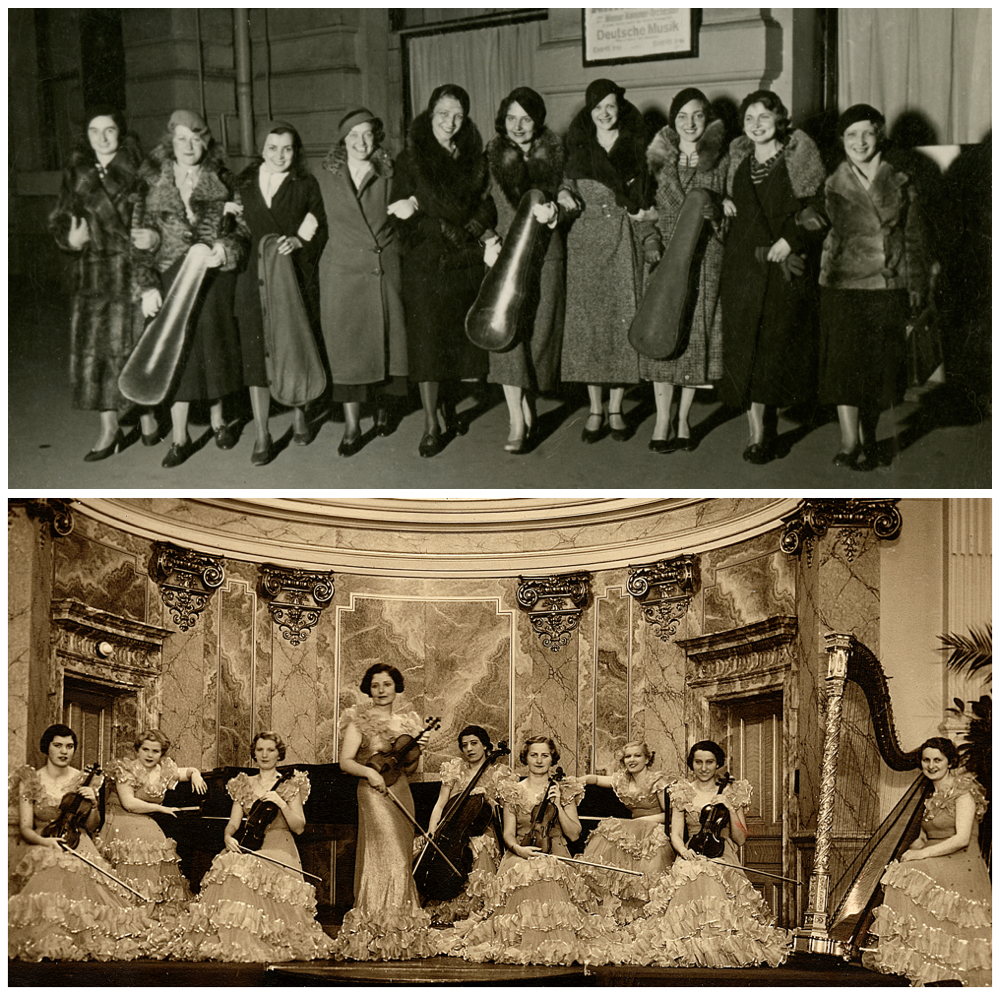
The Wiener Walzermädeln (above, with Alma standing) in the matching designer evening dresses commissioned by Alma and (top) outside one of their concert venues in 1933. Photos: Gustav Mahler–Alfred Rosé Collection, Music Library, Western University, London, Canada
But the face of Europe was changing rapidly. In January 1933 Hitler became German chancellor and a few months later the Nazi terror had begun. Amid the political turmoil, the Wiener Walzermädeln went to Munich for a concert in March 1933, but the show was canceled at the last minute (on April 1, the Reich Minister of Propaganda, Joseph Goebbels, called for a boycott of all Jewish business). Alma, who had invested all her savings in the trip, turned to her husband for help. Příhoda agreed to take care of the costs and the orchestra returned safely to Vienna. Alma never went back to Munich, but she didn’t give up her project. For the following five years the Wiener Walzermädeln gave concerts all over Europe. Years later, several members of the orchestra recalled what a good time they had, but some pointed also out how demanding and difficult to please Alma could be. According to one, Anny Kux: ‘Alma… tolerated no compromises in artistic matters. She demanded a great deal of the girls.’ Another, Ingeborg Tonneyck-Müller, recalled: ‘Alma was a tremendous rarity. Women simply did not do what Alma was doing in those days.’ [8]
‘Alma… tolerated no compromises in artistic matters. She demanded a great deal of the girls’ – Anny Kux, member of the Wiener Walzermädeln
Příhoda filed for divorce on March 9, 1935. The reasons for his decision remain unclear. Some considered it a career move (in September the Nazis would ban marriages between Germans and Jews), but although the Czech authority condemned Příhoda for collaboration with the Nazis at the end of World War II, it is also true that two years after divorcing Alma he married a Jewish doctor. The separation devastated Alma. She sought refuge in music, toured with her orchestra and sometimes played second violin in her father’s quartet.
In March 1938 Hitler proclaimed the annexation of Austria into Nazi Germany. Soon afterwards Arnold Rosé was dismissed from his orchestra. Within a couple of months more than 80% of Jewish business activities in Vienna had been closed down [9] and thousands fled the city. The Rosés were torn. Alfred planned to move to America but Alma did not want to leave Europe. She had just found a new partner, Heinrich Salzer, scion of the owner of the paper mill and publishing company Carl Ueberreuter, but under the new racial laws they could not get married. To make things worse, Justine Rosé died on August 22.
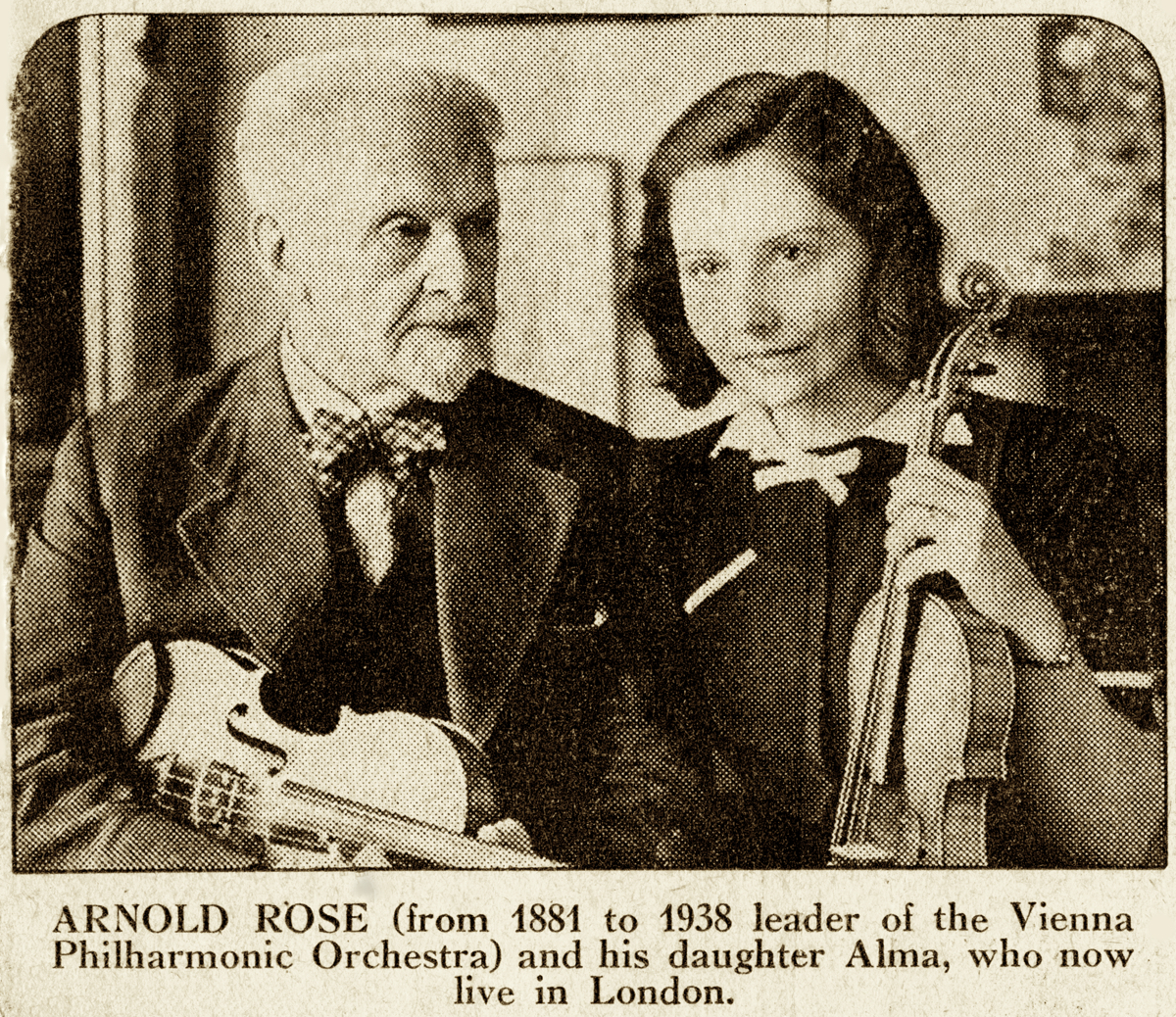
Newspaper clipping of Arnold and Alma Rosé after their escape from Vienna. Photo: Gustav Mahler–Alfred Rosé Collection, Music Library, Western University, London, Canada
Luckily, the Rosés were not alone. The violinist Carl Flesch, who had emigrated to London in 1934, set up a fund to support Arnold, and friends from all over the world sent contributions. Alfred and his wife were able to leave Vienna on September 28, 1938 and embarked on the long journey to America. Alma felt protected by her Czech passport (acquired through her marriage with Příhoda), but when Germany annexed Czechoslovakia in 1939, this became useless.
Alma decided to take action to avoid her father having to part with his beloved instrument. The Stradivari became her ‘personal crusade’
Alma and her father managed to escape to London in March 1939. Salzer went with them but, unable to get a job in England, he was back in Vienna by the end of June. Although he and Alma continued writing to each other for a while, by the end of 1940 he had married another woman. Heartbroken, Alma once again took refuge in music. Her father had managed to reform the Rosé Quartet and asked his daughter to play second violin. Although these concerts brought in some money, it was not sufficient, and Alma’s British work permit allowed her only to play in the quartet. As friends urged Arnold to sell his Stradivari, Alma decided to take action to avoid her father having to part with his beloved instrument. The Stradivari became her ‘personal crusade’. [10]
This crusade was surely why, despite the outbreak of war in September 1939, Alma accepted an engagement to play at the Grand Hotel Central in The Hague, being confident that The Netherlands was out of Germany’s reach. She left England at the end of November. Arnold remained in London and tried in vain to persuade his daughter to come back. The two would never meet again.
Part 2 explores Alma Rosé’s life after 1940, and includes the history of the ‘Rosé’ Stradivari and her own Guadagnini violin.
Alessandra Barabaschi is an Italian art historian and has authored several books including the four-volume ‘Antonius Stradivarius’.
Notes
[1] Mahler, Alma, Erinnerungen an Gustav Mahler, Ullstein, Frankfurt, 1978, p. 37.
[2] Letter from Bruno Walter to his parents, Dec 30, 1901 in Blaukopf, Herta and Kurt, Gustav Mahler – Leben und Werk in Zeugnissen der Zeit, Hatje, Stuttgart, 1994, p. 156.
[3] Goldhagen, Daniel Jonah, Hitlers willige Vollstrecker, Siedler, Berlin, 1996, p. 47.
[4] Mahler, Alma, op. cit., p. 137.
[5] Newman, Richard, Kirtley, Karen, Alma Rosé – Vienna to Auschwitz, Amadeus Press, Portland, 2000, p. 34
[6] Newman, Richard, Kirtley, Karen, op. cit., p. 39.
[7] Bechert, Paul, Enter the Young Generation, Musical Courier, New York, January 13, 1927.
[8] Newman, Richard, Kirtley, Karen, op. cit., pp. 77 & 74.
[9] Aly, Götz; Heim, Susanne, Vordenker der Vernichtung, Fischer, Frankfurt, 1991, reprint 2013, pp. 34–35.
[10] Newman, Richard, Kirtley, Karen, op. cit., p. 125.